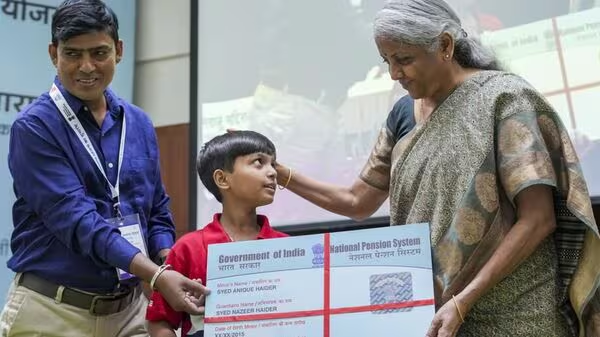The NPS Vatsalya is a pension-cum-savings scheme introduced in 2024 to foster a culture of long-term financial security for children. Regulated by the Pension Fund Regulatory and Development Authority (PFRDA), this scheme is designed to allow parents or guardians to open and manage an account for minors, ensuring a strong foundation for their future financial needs. Once the child reaches 18, they gain full control of the account, which can then be converted into a standard NPS account.
How to Invest in NPS Vatsalya: Parents or guardians can open an NPS Vatsalya account with a minimum contribution of Rs. 500 per month (Rs. 6,000 annually). There is no upper limit to the investment. The scheme can be applied for online via the NPS Trust’s eNPS platform or through registered Points of Presence (PoPs) like banks and post offices. Required documents include proof of the child’s age and the guardian’s identity and address proof.
The scheme offers two investment choices:
- Auto Choice: Here, you can choose between three life cycle funds based on your risk tolerance—Aggressive (LC-75), Moderate (LC-50), and Conservative (LC-25).
- Active Choice: Investors can actively decide on their asset allocation, allowing up to 75% in equity or 100% in corporate/government bonds.
Pros of NPS Vatsalya:
- Long-Term Wealth Building: Given the power of compounding, NPS Vatsalya provides an excellent avenue to accumulate significant wealth over time. An investment of Rs. 5,000 per month, assuming a 10% return, could result in a corpus of Rs. 20 crores by the time the child retires.
- Flexible Investment Choices: Parents can tailor the asset allocation based on financial goals and risk tolerance, ensuring flexibility.
- Low Management Costs: As a government-backed scheme, NPS Vatsalya has lower management fees compared to other equity-linked savings products, potentially boosting overall returns.
- Early Start for Financial Literacy: The transition of the account to the child at 18 years instills financial responsibility and an early start to retirement planning.
Cons of NPS Vatsalya:
- Tax Uncertainty: As of now, there is no clarity on tax benefits for the scheme, especially under the new tax regime. Without clear incentives, the attractiveness of NPS Vatsalya may be limited.
- Potential Discontinuation at 18: Once the child reaches adulthood, they hold full control over the account. If they choose not to continue the investment, the long-term goal of retirement planning could be compromised.
- Limited Early Withdrawals: Only 25% of the corpus can be withdrawn before retirement, potentially restricting access to funds for immediate needs like higher education.
- Market Risks: As an equity-linked scheme, returns are subject to market fluctuations, which could result in variability in the corpus at maturity.
Conclusion: NPS Vatsalya is a promising option for long-term financial planning for children, offering the potential for significant wealth accumulation through compounding and flexible investment options. However, investors should be cautious about the lack of clarity around taxation and the risks associated with market-linked investments. It’s a scheme best suited for those looking for disciplined, long-term investments aimed at retirement.





